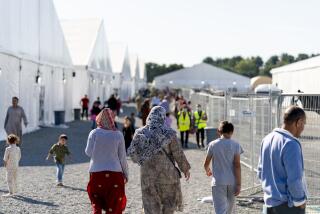Nobody wins in the Afghan runoff election
- Share via
Politicians love photo-ops. So when Sen. John Kerry (D-Mass.) appeared alongside Hamid Karzai as the beleaguered Afghan president announced that he would agree to a runoff election, it was hardly surprising. Kerry was doing what politicians do.
Moreover, the senator was in Kabul to supplement the Obama administration’s efforts to lean on Karzai to hold another presidential vote, given widespread evidence that the one held in August was rigged. When Karzai claimed victory then, his main opponent, former Afghan Foreign Minister Abdullah Abdullah, cried foul, a chorus of international criticism arose and an Afghan government infamous for its ineptitude and sleaziness looked even more illegitimate.
It’s this tricky context that makes Kerry’s photo-op problematic.
The Obama administration knows that no amount of firepower in the war will substitute for an Afghan government that is minimally effective, has the confidence of its people and is seen as independent. The Taliban knows this as well, which is why, in addition to mounting an insurgency and launching suicide bombings, it has been busy painting the Americans as occupiers and Karzai as their puppet. The spectacle of the 6-foot-tall U.S. senator standing next to the Afghan president, who everyone knows was arm-twisted into making a concession he had resisted, simply helps the Taliban’s PR campaign.
It’s hard to imagine that Kerry was freelancing and was not in touch with the White House or the State Department while he was cajoling Karzai. So one wonders whether the administration considered the implications of having Kerry looming over the diminutive Afghan president. What’s certain is that it will present Karzai’s announcement as a diplomatic success. But in fact, Karzai’s concession introduces more problems.
The runoff is to be held on Nov. 7 -- that’s less than three weeks from now. Organizing it that quickly would be hard even for an honest and efficient government. But the Afghan government is an amalgam of consummate crookedness and incompetence. The first attribute means that the same dishonest impulses that led it to cheat in the August election will tempt it to steal the vote in the runoff -- and to parry the ensuing criticism by arguing that Karzai went the extra mile by agreeing to a second round in a vote that he had rightfully won in the first.
The obvious solution is to make it very hard for ballot-rigging to occur. Yet given that violence is on the upswing in Afghanistan, can election monitors, especially if they are non-Afghans, do their job without risking life and limb? If not, what will ensure a clean vote?
The Karzai government’s other trait, incompetence, boils down to this: It effectively has no control over large parts of the country, which are run by the Taliban or are dangerous because Taliban fighters are active there. This means that it is not capable of holding a fair election.
If the runoff is tainted, the divisions within the Afghan political class will become even deeper (hard as that is to imagine), the government will lose even more respect among Afghans (also hard to imagine), the Taliban will be delighted, and the U.S. will have an even more difficult time doing what the Obama administration seems confident it can do: creating viable institutions of governance in Afghanistan.
Then there’s the matter of making sure voters don’t get killed while voting. Even now, the combination of Afghan police and troops and American and allied forces is unable to stem the tide of Taliban-generated violence. That is precisely why Army Gen. Stanley A. McChrystal, the commander of U.S. and allied forces in Afghanistan, has asked for 40,000 additional troops.
It’s a sure bet that the Taliban, true to form, will warn voters to stay at home during the vote on pain of death, and try to kill those who are not intimidated. It has become a formidable force and is no longer confined to its Pashtun strongholds in the south and east. This raises the question of how the country can be made safe enough to ensure a reasonable turnout.
A vote in which few take part and many that do are killed or maimed will hardly enable American soldiers to convince ordinary Afghans that they are capable of protecting them from the Taliban. But winning the confidence of Afghans on this very point is pivotal to McChrystal’s strategy.
What about a surprising outcome: a fair vote that is won by Abdullah? That denouement would cashier the Karzai government for sure, but it would also make an old problem much worse. Abdullah is a Tajik, and tensions among Tajiks, Pashtuns, Uzbeks and Hazaras have long been part of Afghanistan’s politics. The Pashtuns have dominated the country’s politics (Karzai is a Pashtun, and the Taliban is overwhelmingly Pashtun) and will not meekly hand over the reins of power -- the stakes are too high. Instead, they will resist, and Afghanistan’s ethnic divisions will deepen.
The Obama administration takes umbrage when critics charge that it is engaged in nation-building in Afghanistan. But that is exactly the mission that it (and those on the right who call for a bigger U.S. role in Afghanistan) has embarked on, whether it knows it or not. And although a runoff election will be hailed as a political victory by the White House, it will not make this enterprise any easier.
More to Read
Get the L.A. Times Politics newsletter
Deeply reported insights into legislation, politics and policy from Sacramento, Washington and beyond. In your inbox twice per week.
You may occasionally receive promotional content from the Los Angeles Times.










